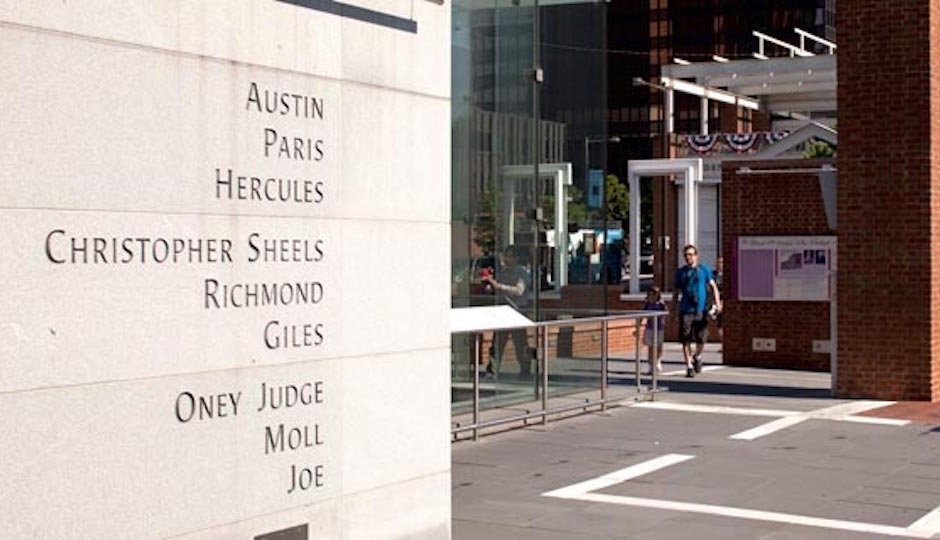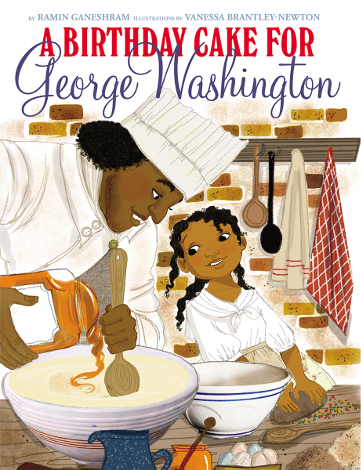Scholastic Pulls Children’s Book Featuring Washington’s Slave in Philly

The names of George Washington’s slaves are inscribed at the President’s House Memorial on Independence Mall. National Park Service photo by Joseph E.B. Elliott.
[Updated Tuesday, January 19th, at 4:38 p.m.]
After both its author and its editor defended the title in the face of critical onslaught, Scholastic Books yesterday announced that it would no longer distribute “A Birthday Cake for George Washington,” a children’s book based on research conducted in Philadelphia, where its principal subject, Washington’s enslaved master chef Hercules, lived while the city was the nation’s capital.
The statement Scholastic released read in part, “While we have great respect for the integrity and scholarship of the author, illustrator, and editor, we believe that, without more historical background on the evils of slavery than this book for younger children can provide, the book may give a false impression of the reality of the lives of slaves and therefore should be withdrawn.”
The book was written by food writer Ramin Ganeshran, illustrated by Vanessa Brantley-Newton, and edited by Andrea Davis-Pinkney. It emphasizes Hercules’ stature in his time as something of a culinary celebrity, and its illustrations depict him and his daughter Delia smiling as they prepare a perfect cake for the most famous man in America without using any sugar, a difficult challenge.
Kirkus Reviews, in an essay comparing this book with a similar title released a year earlier that also focused on slaves in the kitchen, “A Fine Dessert,” put its finger on the crux of the criticism when reviewer Vicky Smith wrote this about the apparent contradiction between the happy Hercules depicted in the book and the house slave who escaped while in Philadelphia, a fact omitted from the narrative:
“It’s easy to understand why Ganeshram opted to leave those details out of her primary narrative: they’re a serious downer for readers, and they don’t have anything to do with the cake. But the story that remains nevertheless shares much of what A Fine Dessert’s critics found so objectionable: it’s an incomplete, even dishonest treatment of slavery. The back jacket’s tailpiece vignette is a picture of a smiling George Washington, his arm around Hercules’ shoulders. Hercules and Delia are likewise smiling; it’s like a family picture — except it isn’t.”
That criticism, and similar critical comments made by others, led Scholastic to change its mind.
The offices of Independence National Historical Park, which administers the President’s House Memorial, were closed for the Martin Luther King holiday.
Michael Coard of the Avenging the Ancestors Coalition, which led the battle to incorporate the slaves into the President’s House Memorial, had this response to the news:
“Although Scholastic did the right thing by withdrawing that garbage disguised as a book, it never should have distributed it in the first place. Who proofreads at Scholastic? An even better question is ‘Who reads at Scholastic?’ Didn’t someone there know that slavery was about kidnapping, buying, selling, torturing, raping, castrating, dehumanizing, and lynching and not about ‘happy Negroes’ baking or eating a fucking cake for a president who enslaved 316 Black men, women, and children at Mt. Vernon and illegally enslaved nine in Philly.”
Follow Sandy Smith on Twitter.



